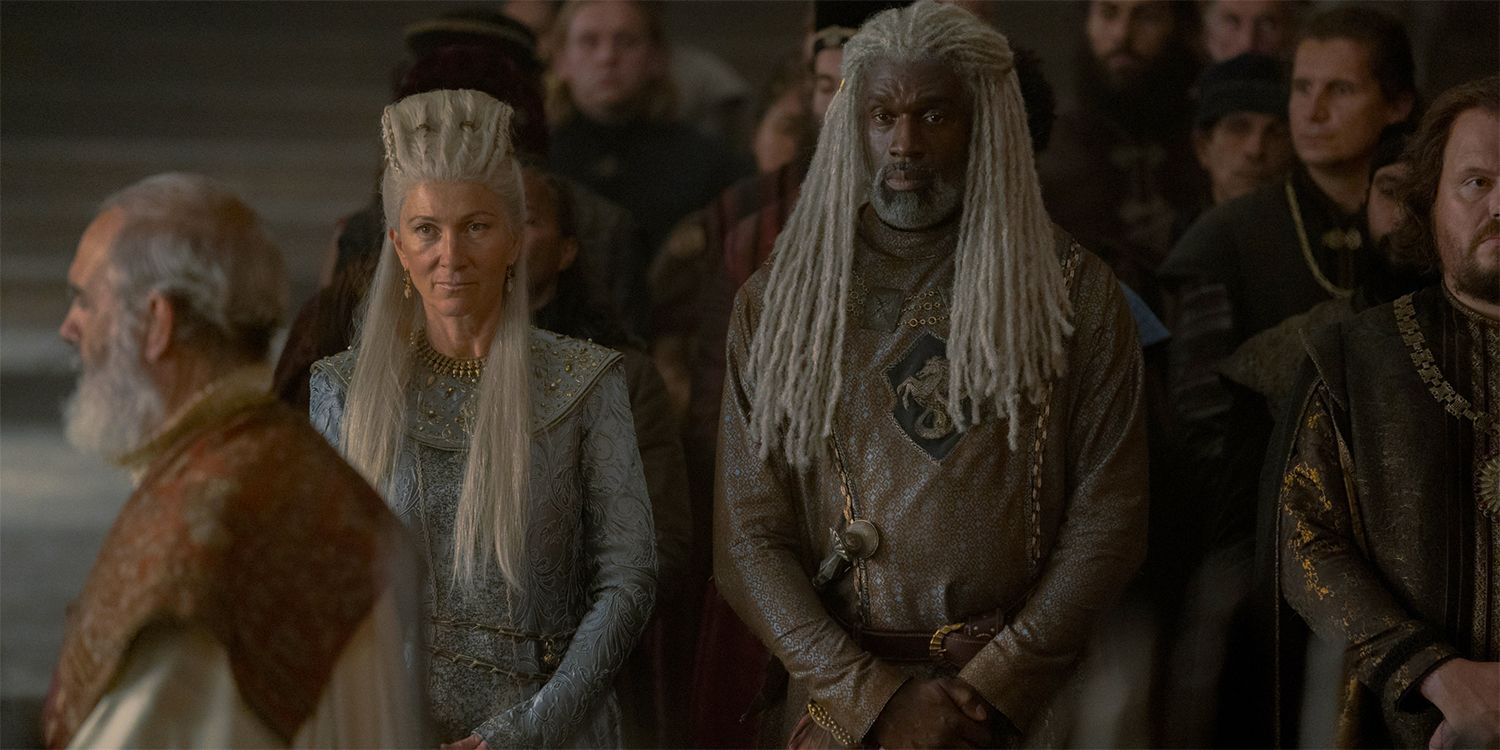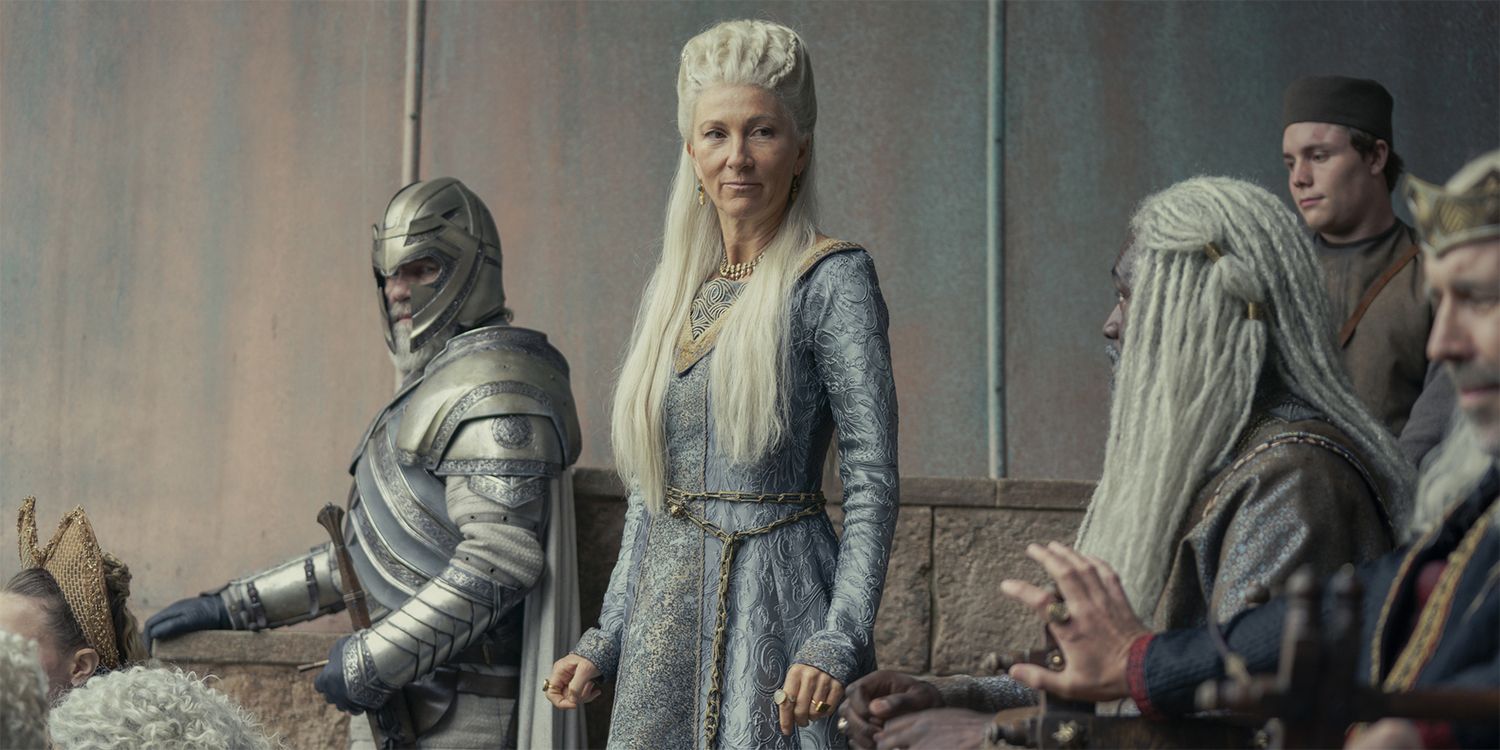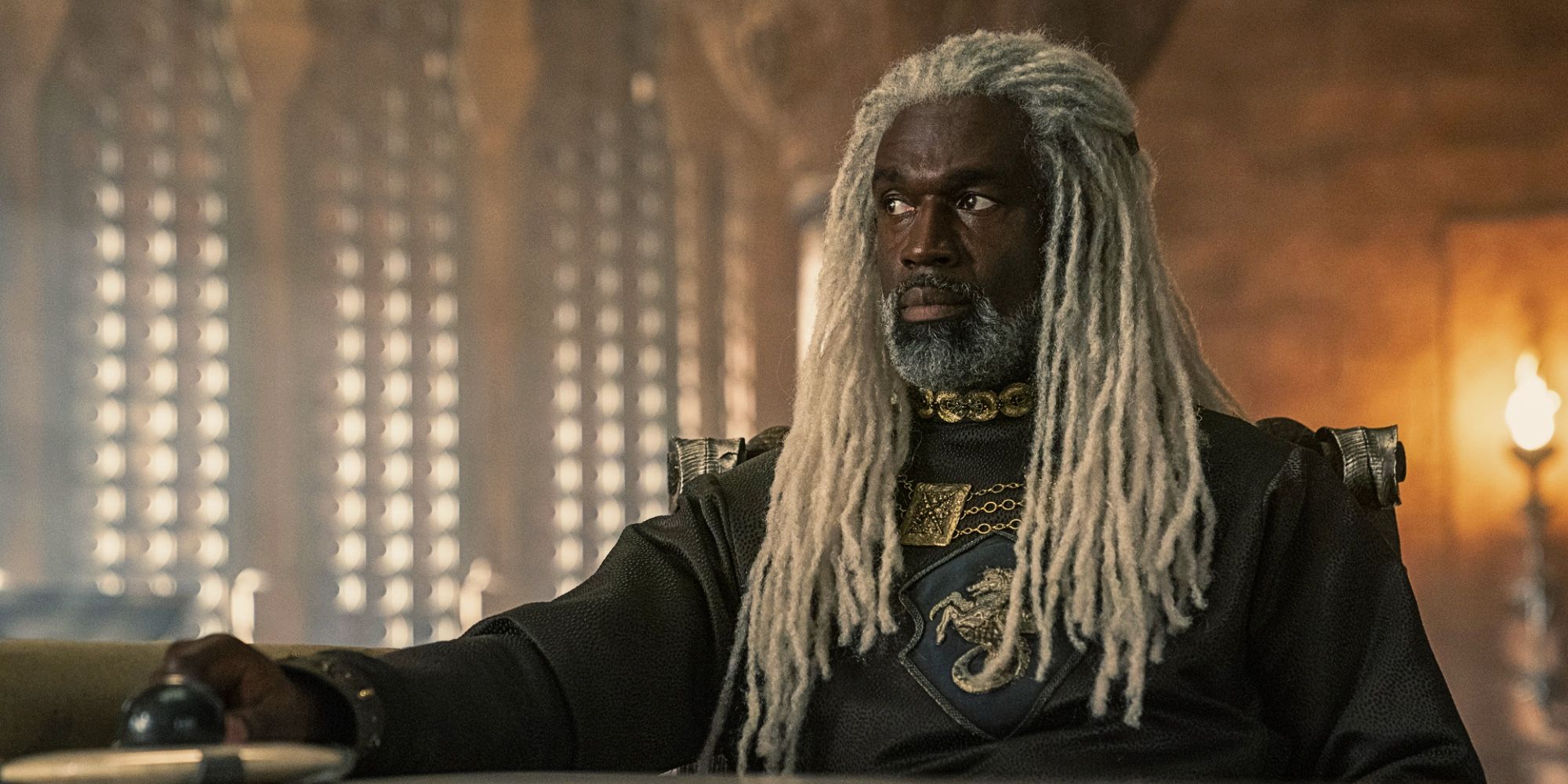D-day is upon us, with House of the Dragon season 1 premiering August 21 on HBO. The Game of Thrones prequel series zeroes in on House Targaryen, recounting the family feuds and bloodline betrayals that eventually splinter the realm apart. The details of this time period, which is nearly 200 years before the birth of Daenerys, are pulled not only from the first five novels in George R.R. Martin's A Song of Ice and Fire series but also from his more recent Fire & Blood.
Enmity among the royal family is at the heart of House of the Dragon—namely between heir to the throne Rhaenyra Targaryen (played by Milly Alcock as a youth and Emma D'Arcy as an adult) and queen Alicent Hightower (portrayed by Emily Carey and later Olivia Cooke). But the court is made up of more than queens, and House Velaryon will play an important role as well. The Master of Ships, Corlys Velaryon (Steve Toussaint), and his wife Rhaenys Targaryen (Eve Best) are both prominent characters who are very invested in the Iron Throne.
During a recent round table interview, Screen Rant and other media outlets had to opportunity to speak to Best and Toussaint about their surprisingly equal relationship in House of the Dragon, how the sting of the succession has affected their characters, and which set details mean the most to them.
WARNING: Spoilers for episode 1 of House of the Dragon!
In the first episode, Corlys mentions the Triarchy. We saw a lot in Game of Thrones, somebody being like, "There's actually this big problem over here," and everybody else talking about their squabbles. Could you speak about that moment, and what went into as you were working on your character?
Steve Toussaint: Corlys [Velaryon] is someone who has actually been involved in war and battle. No one else in the room has done that, so that he feels that gives him a particular insight. He talks about the Triarchy and the fact that they are growing in strength in this particular part of the land, if they're allowed to go unchecked, they will start to control a very vital seaway. Which will not only affect his home and the trade routes, but also will affect the whole realm.
And I think he is frustrated by the fact that he's explaining what it is, and what needs to be done. And yet somehow, certainly in Corlys' eyes, Viserys is prevaricating. "Oh, there's a way that we can talk about it. We can blah, blah, blah." And it's like, "No, in this situation, you act." Because you have to extract respect.
In fact, later on, there's a line where my character says to one of the others, "What reason do they have to fear us? Because we're not doing anything." He's very much a man of action. I think he's a soldier in a room full of politicians, and I think he finds that intensely frustrating.
Screen Rant: Rhaenys is known as the Queen Who Never Was. How does that shape her decisions throughout the season?
Eve Best: Well, I think it shapes her up until the moment that we start, because I can't obviously speak to what happens next without giving the game away. When that happened, that essential primary miscarriage of justice—which is what it was—it went really deep. It's like a dagger to the heart. I think that's where her vulnerability really is.
She has this super cool exterior. There's even a stage direction at one point that says, "Rhaenys [permanently cool]." Compared with her husband, who's deeply passionate and deeply engaged and very definitely on the front foot in terms of action, she is very passive; super remote [as] a person. She's very removed. It's like she's almost closed down her emotional toolbox, as a coping mechanism to deal with pain—but also as a political way of navigating these very choppy waters of this intensely volatile and corrupt environment that they all are in.
[She wants] to find a way to position herself in a way that holds onto her own self-respect in the face of such a crushing defeat, and also the respect of other women around her. Because she's a strong woman in a very focal position, even though she is technically role-less, which is another source of great potential humiliation: to be so prominent and so in the spotlight, but actually have nothing to do. They have nothing to do except for give wine to their men, or possibly die in childbirth, and it was kind of one or the other.
It's charting a course through that and finding a way to [not] hold your wound on your shoulder and let it become a source of bitterness, and somehow find a standpoint that is positive and useful. But nor to deny your own humanity, which is... Sorry, but I'm really pissed off. [Laughs]
Can you speak on how that influences her relationship with Rhaenyra as she grows up?
Eve Best: I think the relationship with Rhaenyra is so interesting, because it's really complicated. Because on one hand, she's a woman, and she's a young woman. And I think Rhaenys sees a lot of herself in Rhaenyra; this young, super smart, quite rebellious, also a dragon rider, very privileged young woman who's been groomed to be the next ruler. The resonances are very strong.
And certainly, at the moment when Rhaenyra is being named as heir by Viserys, it's very complicated for Rhaenys. Because on one hand, it's a wonderful thing that that is happening, of course, for womankind and for the progression of the state. And it's exactly everything that she applauds and has fought for on her own behalf and her peers and the realm. It's very, very positive.
But at the same time, as a human being, it is challenging to witness. There's always the human voice; the small child voice that cannot be silenced. It's painful to watch, because that could have been me. "Why wasn't it me? And was it a problem with me ultimately? Or was it just the system?" I think the frustration and the shame of feeling somehow that one's failed, simply as a result of one's own position in a historical context, is a bitter pill to swallow. And it's really hard to watch.
I think when she starts with Rhaenyra, she falls between feeling partly like a mentor and a supporter—and partly like she's an antagonist. I just want to give her a big slap, frankly, and take her down a peg or two.
A lot of the cast has mentioned visiting the sets and feeling like you are actually in the world, because they're so built out and ornate. Were there any production details that felt like an Easter egg to something larger or something fun to help you ground your character and your performance?
Steve Toussaint: In the set that is our home, Driftmark, the Hall of Nine is full of artifacts that would have come from the legendary nine voyages that Corlys made way before we meet him in this show. The first time I saw them, of course, we were amazed because the craftsmanship is incredible.
What was fascinating was that one afternoon I said to Ryan, our co-showrunner, "Would it be possible to have a little bit of information about each of these artifacts? It's not going to be in the script, it's just for me. So that when I'm walking around this set, I can create a memory of what I did to get that object back home." He said, "Yeah, sure." And I think within the evening, he created this dossier of all this information of each of the voyages and these objects, so that I could look at this facsimile or whatever it is of a calf and go, "Yeah, I got that when I went and traded with so-and-so." Or, "I got that when I fought those people." It was amazing.
And there's stuff in that room that I don't want the camera even picks up, like charts and things like that. It's just fabulous. That was the thing for me. Ryan is geek central, and he had this information that he could just immediately go, "Yeah, that was that, that was that, and that was that." It was extraordinary.
Eve Best: I had that same experience on our set, on Driftmark, as well. I wanted the camera to pick up all of his incredible details. But for me, it was more about the costume and the wig.
I had a very useful experience early on, because the very first scene that we shot—the first scene of the whole shoot—was a scene between me and Steve, right in the middle of the show. It was like from episode 7, I think. It was an incredibly emotionally intense scene; something very bad just happened, and it was almost like a crisis of our relationship. And I remember on the first day, my hair was done in a certain way. The hairdo just felt all wrong. And I remember going back to the costume [department], and I couldn't have prescribed it, because I didn't know that it was wrong until it was actually on my head.
But as you know from being a woman, what you do with your hair and what you do with your clothes says so much information about where you are emotionally inside. I think it does with guys too, but possibly to a lesser extent. Before you even open your mouth, so much is told by what your hair is like, and how you dress, and how you present yourself to the world. There was something instinctively that kicked in that felt it didn't chime, and I hadn't known that until I actually had seen the wig.
Then we were able to go back and have conversations about what adjustments needed to be made. It felt very important that she was a dragon rider, and that's a very strong part of her identity. And how to explore that through the hair and the clothes, and what that dichotomy is between somebody who's on one hand very regal at court and a very conventional kind of person apparently. But yet she's also a wild, badass, dragon-riding queen. And that's a nice combination of things that needs to be complicated.
Screen Rant: I love the dynamic between both of you. Even in the first episode, we see that there is a deep amount of love and also respect between the two of you. Can you talk about how that might be different from other relationships we see in this show?
Steve Toussaint: All of the other relationships are damaged! Trashed. Obscene. [Laughs]
Eve Best: Incestuous! Weird.
Steve Toussaint: The only other relationship that is close to being a loving relationship is the king and his first wife, and she's dead within seconds.
Eve Best: And also, you get the feeling that they're not necessarily peers. I mean, you hardly see their relationship. And I think she's quite a bit younger, isn't she?
What's really interesting for us and our dynamic is that they're very much... There are resonances with Lady Macbeth and Macbeth, only insofar as that term, "My dearest partner of greatness," which is how Macbeth refers to his wife. It really feels like a partnership, and it's very modern in that respect. It's very equal and very based on mutual respect, and in terms of power, it's absolutely 100% and alliance.
Steve Toussaint: It's not a merger, yeah.
I don't think we ever talked about how they met. I don't think we ever talked about that. But in my head, I always had this idea that he had come back from one of his voyages, and he was in court, but he was not quite as polished as the people there.
Eve Best: He was a bit rough.
Steve Toussaint: And that was kind of an appeal. Also, the fact that she didn't look down on him, because one of the things in this world is that his house prior to his voyage is was nowhere near as rich as the others. [It was] not as grand, but he went on made a fortune.
Eve Best: And I think that's what she really loves about him, as well. He's a self-made man. It's incredibly appealing. It's very sexy, actually.
Steve Toussaint: So, there you go. You heard it here first.
I am happy to see more melanin in genre, and it's always good to see black and brown people reflected onscreen. What was the process of reimagining the character with Ryan, and did George R. R. Martin participate early on?
Steve Toussaint: To be honest, a lot of that I can't answer, because I don't know what the decisions were in terms of this casting. It was never something that came up. Literally, it was just, "Here's a part, and I'm going to try and get it." I'd never read any of the books. I never knew anything about it.
To be frank with you, the first time I realized anything about this character's color in the books was when my name was announced as the lead. And then there was all this backlash, and all this stuff coming up. I think one of the first things I saw was someone had put an artist's impression of Corlys from the books next to my picture and said something like, "Why?" And so I was like, "Right, I see. This character was meant to be white, is he?"
That was the first time I saw it. It was never a consideration. I never wasted my time in bothering to ask Ryan and Miguel why they cast me. I don't give a damn. I was happy that I got the part; I decided I got the part because I earned it. And anybody who has an issue with it? They'll have an issue with it, man. It's naught to do with me.
House of the Dragon Synopsis
House of the Dragon, the eagerly awaited prequel to Game of Thrones, is based on George R. R. Martin’s Fire & Blood. Set some 200 years before the events that unfolded in Game of Thrones, this is the remarkable, turbulent story of the House of Targaryen.
Check out our other roundtable interviews with House of the Dragon stars Matt Smith & Fabien Frankel, Emma D'Arcy & Olivia Cooke, Milly Alcock & Emily Carey, and Paddy Considine, as well as with showrunners Ryan Condal & Miguel Sapochnik.
House of the Dragon premieres August 21 on HBO and HBO Max at 9pm ET/PT.



